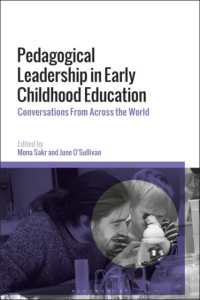Full Description
Studies on discourse and language learning originated in the field of general education and they focused on first language learning environments. However, since 1980s research on discourse and language learning broadened the scope of investigation to respond to second and foreign language environments. Recently, the emergence of new language learning contexts such as computer mediated communication, multilingual settings or content and language integrated contexts requires further research that focuses on discourse and language learning. From this perspective, the present volume aims to broaden the scope of investigation in foreign language contexts by exploring discourse patterns in the classroom and examining the impact of factors such as gender, explicitness of feedback or L1 use on language learning through discourse.
With that aim in mind, this volume will bring together research that investigates discourse in various instructional settings, namely those of primary, secondary and university L2 learning environments, content and language integrated contexts and other new language learning settings. The number and variety of languages involved both as the first language (e.g. English, Finnish, Basque, Spanish, Japanese, French, Italian, Catalan) as well as the target foreign language (e.g. English, French, Italian, Japanese, Spanish) makes the volume specially attractive. Additionally, the different approaches adopted by the researchers participating in this volume, such as information processing, sociocultural theory, or conversation analysis, widen the realm of investigation on discourse and language learning. Finally, the strength of the volume also lies in the range of educational settings (primary, secondary and tertiary education) and the worldwide representation of contributors across seven different countries, namely those of Spain, France, Austria, Finland, Germany, Canada, Australia and the United States.
The uniqueness of the volume is due to its eclectic and comprehensive nature in tackling instructional discourse. Worldwide outstanding researchers, like Julianne House, Carme Muñoz, Ute Smit, Tarja Nikula or Roy Lyster, to quote but a few, adopt different perspectives in this joint contribution that will certainly broaden the scope of research on language learners' discourse.
Contents
Eva Alcón Soler and María-Pilar Safont-Jordà: Introduction
Discourse in L2 learning contexts
Elsa Tragant and Carme Muñoz: Primary school teachers' language practices. A four-year longitudinal study of three FL classes
Nathalie Blanc, Rita Carol, Peter Griggs and Roy Lyster: Lexical scaffolding in immersion classroom discourse
Rita Tognini and Rhonda Oliver: L1 use in primary and secondary foreign language classrooms and its contribution to learning
Yumiko Tateyama: Repair in Japanese request sequences during student - teacher interactions
Discourse in Content and language integrated contexts
Ana Llinares and Tom Morton: Social perspectives on interaction and language learning in CLIL classrooms
Tarja Nikula: On the role of peer discussions in the learning of subject-specific language use in CLIL
Ute Smit: English as a Lingua Franca (ELF) and its role in integrating content and language in higher education. A longitudinal study of question-initiated exchanges
Discourse in new language learning contexts
Juliane House: Identity and face in institutional English as Lingua Franca discourse
Josep Maria Cots and Laura Espelt: The voices of immigrant students in the classroom: discourse practices and language learning in a Catalan-Spanish bilingual environment
César Félix-Brasdefer: Email openings and closings: pragmalinguistic and gender variation in learner-instructor cyber consultations
Issues for further research on discourse and language learning
Agurtzane Azkarai and María del Pilar García Mayo: Does gender influence task performance in EFL? Interactive tasks and language related episodes
Patricia Salazar: Exploring learners' reaction to corrective feedback from stimulated recall interviews
Laura Portolés-Falomir and Sofía Martín-Laguna: Code switching in classroom discourse: A multilingual approach








